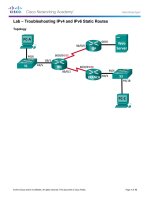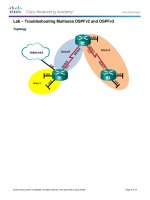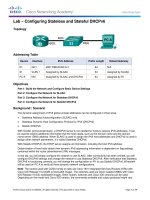2 asp dotnet core api building first m2 slides kho tài liệu training
Bạn đang xem bản rút gọn của tài liệu. Xem và tải ngay bản đầy đủ của tài liệu tại đây (256.15 KB, 24 trang )
Creating an API and Returning
Resources
KEVIN DOCKX
ARCHITECT
@KevinDockx
Coming Up
ASP.NET Core MVC Middleware
Returning Resources
Interacting with our API
Configuring the Response
Middleware for Building an API
ASP.NET Web API
ASP.NET MVC
(http services)
(client-facing web applications)
ASP.NET Core MVC
Clarifying the MVC Pattern
Model-View-Controller
Architectural pattern
Loose coupling, separation of concerns:
testability, reuse
Not the full application architecture!
Clarifying the MVC Pattern
Model
View
Controller
Clarifying the MVC Pattern
Consumer of the API
Model
Resource representation
(often JSON)
Demo
Adding the ASP.NET Core MVC
Middleware
Demo
Returning Resources (part 1)
Learning About Routing
Matches request URI to controller method
Convention-based and attribute-based
routing
app.UseMvc(config => {
config.MapRoute(
name: "Default",
template: "{controller}/{action}/{id?}",
defaults: new { controller="Home", action="Index" }
); });
Convention-based Routing
Conventions need to be configured
Not advised for API’s
Attribute-based Routing
Attributes at controller & action level,
including an (optional) template
URI is matched to a specific action on a
controller
Routing
HTTP Method
Attribute
Level
Sample URI
GET
HttpGet
Action
/api/cities
/api/cities/1
POST
HttpPost
Action
/api/cities
PUT
HttpPut
Action
/api/cities/1
PATCH
HttpPatch
Action
/api/cities/1
DELETE
HttpDelete
Action
/api/cities/1
---
Route
Controller
---
Demo
Returning Resources (part 2)
Demo
Improving the Architecture with Model
Classes
The Importance of Status Codes
Part of the response
Provide information on
- Whether or not the request worked out
as expected
- What is responsible for a failed request
The Importance of Status Codes
Level 200
Success
Level 400
Client Error
Level 500
Server Error
200 – OK
400 – Bad Request
201 – Created
401 – Unauthorized
500 – Internal
Server Error
204 – No Content
403 – Forbidden
404 – Not Found
409 - Conflict
Demo
Returning Correct Status Codes
Demo
Returning Child Resources
Demo
Working with Serializer Settings
Formatters and Content Negotiation
Selecting the best representation for a
given response when there are multiple
representations available
Media type is passed via the Accept header
of the request
- application/json
- application/xml
- …
Formatters and Content Negotiation
Output formatter
Input formatter
Deals with output
Media type: accept header
Deals with input
Media type: content-type header
Demo
Formatters and Content Negotiation
Summary
Model-View-Controller
- Model: application data logic
- View: display data
- Controller: interaction between View
and Model
- More reuse, better testability
Routing: maps URI to controller method
Summary
Content negotiation: selecting the best
representation for a given response
- Output formatters (accept header)
- Input formatters (content-type
header)









